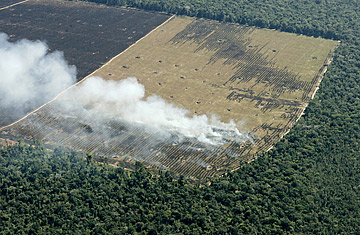
Hundreds of acres of former Amazon jungle destroyed by loggers and farmers lie next to virgin rain forest in Mato Grosso, one of the Brazilian states with the greatest deforestation
For the people who live in the Brazilian rain forest, the perfectly logical thing to do is cut it down. Large swaths of the rain forest are burned or chopped down each year (4,621 square miles in 2008) because that land is worth more to its human denizens deforested — for the value of the timber and the cleared farmland — than it is intact.
The ecological fallout is, of course, immense. The Amazonian rain forest is perhaps the most densely populated place on Earth — inhabited by a vast variety of plants and animals that we have not yet begun to map — and it is also the largest terrestrial carbon sink on the planet, absorbing 2 billion metric tons of carbon dioxide in a normal year.
The argument for deforestation has always been that the economic benefits to local communities are too great to overlook. But now a new study in the current issue of Science suggests that's not true. A team of researchers from Portugal, France and Britain studied nearly 300 Brazilian municipalities on the frontier of the Amazonian rain forest, assessing their development levels — based on income, life expectancy and literary rates — before deforestation and afterward. Researchers found that logging forests and converting the land to pasture and agriculture initially raised development levels in a burst of prosperity. But in the years that followed deforestation, that bubble of prosperity popped, and development levels declined until on average the communities were no better off than they had been before the trees were destroyed.
The result is a boom-and-bust pattern that destroys irreplaceable forest but does little to improve long-term prosperity. "It really is a lose-lose situation," says Robert Ewers, a biologist at Imperial College London and a co-author of the study. "The forest is gone so you lose the conservation value of the forest, and eventually you lose the additional income as well."
It's not hard to see why deforestation pays off, at least initially. As trees are cleared, they can be sold for timber — and the buzz of activity surrounding deforestation attracts migrants who capitalize on newly available land, timber and minerals. As the human population increases, so does the demand for roads and other transportation that can connect once isolated communities with valuable markets, and vice versa. That also leads to better access to education and health care, which helps boost literacy rates and life-expectancy levels. Eventually, development levels in newly deforested communities can match and even exceed the Brazilian average.
But those improvements are transitory. The denser population quickly uses up the new natural resources, as timber is sold, and the Amazonian soil, never rich to begin with, is rapidly exhausted. (The researchers note that by the early 1990s, more than 75% of the land that had been deforested up to then had been converted to pasture — and that one-third of that territory had already been abandoned.) Per-capita income, life expectancy and literacy rates all drop, as jobs disappear and the better-educated, better-off migrants move onto the next frontier. "In net terms," the authors write, "people in municipalities that have cleared their forests are not better off than those in municipalities who have not."
That's the problem, though. While deforestation apparently offers few long-term benefits, Brazilians in forested communities aren't very well off either — at least by Western standards — as there is still little to stop them cutting down trees, even if it's only for short-term gain. Deforestation is still unlikely to stop, at least for economic reasons. "For a win-win situation, you need to install some value for standing trees," says Ewers.
The rain forest may be an irreplaceable part of Earth's ecology, but there's no way to sell that on the market yet. However, there is a nascent movement to put a dollar value on the billions of tons of carbon sequestered within the rain forest: in avoided deforestation, forest communities like those in Brazil could essentially be paid for not cutting down their trees, by trading on the carbon value of their forest in a global greenhouse-gas market. With tropical deforestation responsible for up to one-third of global carbon emissions, there's a powerful climate reason to find a way to economically end rainforest destruction.
Currently forests aren't included in the Kyoto Protocol, but there is a lot of optimism that avoided deforestation will be a part of whatever global deal is negotiated at the U.N. climate summit in Copenhagen at the end of the year. (Diplomats are meeting this week in Bonn to work out some of the early details.) The Science study provides one more piece of evidence that forests — especially for those who depend on them — are ultimately worth more alive than dead.
